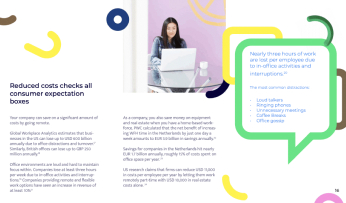Have you always envied smooth talkers?
You know. The silver-tongued folk who can sell sawdust to lumber mills?
Everyone adores them.
Their extraversion is mesmerising and they make even boring office parties better.
Well, anyone can brush up their social charisma by improving their communication skills. One quick way to do it is by working in customer service.
One thing you’ll quickly learn on this job is to speak nicely. Dealing with different people day after day — some grumpy, some dissatisfied, some dejected — is great practice.
Being able to communicate is also a crucial skill for your professional life, one that has a significant impact on your career.
Talk isn’t cheap
According to Forbes, 58% of recruiting professionals believe soft skills like effective communication are a must-have for leadership and management roles.
Soft skills sum up how you do your job, not your technical know-how. You can expect to be assessed on them when applying for most senior work positions.
Universities don’t offer degrees for effective communication. But in a world of disappearing jobs and automation, those skills are of high value to recruiters. They require social skills only humans are capable of.
The MVPs of the modern workplace are leaders who can navigate difficult conversations. Developing effective communication skills means being able to articulate your thoughts. To see the bigger picture and the critical thought and adaptability that follows.
Stanford research shows that productive communication boosts your career while customer service teaches you how to communicate professionally. It grooms your speaking style, how you express thoughts and opinions, and your attitude towards others.
But how?
Listen first, talk later
In business, contrary to Mark Antony’s famous ‘Lend me your ears’ speech, the crux of great communication skills is actively listening.
Start your effective communication journey by learning how to listen. Only by paying careful attention to what a customer is saying will you be able to target the help you offer.
Active, patient listening leads to a deeper understanding of core issues. It nurtures your problem-solving skills and allows for accurate resolutions. You’ll also develop handy persuasion and negotiation skills when handling clients and co-workers.
Being a patient listener improves the quality of your work interactions and relationships.
Soften your speech
Effective communication requires a high level of Emotional Intelligence. E.I. is your ability to empathise and respond appropriately to social cues.
Showing empathy during customer interactions is integral. The word ‘care’ exists for a reason. It’s so important that the Chairman and CEO of Microsoft, Satya Nadella, declared: “care is the new currency”.
Working in customer service enhances your empathic abilities. By imagining the customer’s perspective, relating to their experience, and being accountable for mistakes, you can hone your empathy.
Displaying empathy is a crucial communication skill. Poor customer experience has cost businesses upward of $75 billion a year. Unappreciated customers simply stop doing further business with a brand.
Companies prefer promoting leaders with high levels of emotional intelligence as it makes them excel at human interaction. The main reason for leadership failure is linked to a deficiency in E.I.
If you’re interested in career growth and leading a team someday, build your level of empathy.
How to shine
To be a good communicator you need to remember three basic rules. These guidelines are the key to carrying out your job. But they’re also good signposts on your path to better communication.
Avoid negativity
In general, people prefer positive information. Being negative in language or tone erodes motivation and faith. For best practices, frame your communication with “dos” rather than “don’ts” and focus on what’s possible versus what isn’t.
Personalise
We’re living in a time where bots and AI are auto-filling our messages. Personalise your communications so it’s clear you’re not an algorithm. Use a natural, conversational tone and be true to yourself. Everyone responds well to authenticity, it builds trust.
Be clear
Customer service is about keeping interactions concise and relevant. The same can be said for effective communication. By sharing precise information, you’re valuing someone else’s time. However crucial the data, convey it simply, clearly, and make it easy to follow.
Where to go from here
Communication isn’t just your ability to speak. It’s your capacity to listen, understand, and converse. Good communicators are attuned to their audience and calibrate their interactions accordingly.
As per McKinsey, we could all do with some more practice on how to be good communicators. A survey of 18,000 people in 15 countries revealed all the respondents’ proficiency in communication skills was less than average. The lacking skills are:
- Active listening
- Asking the right questions
- Synthesising messages
- Public speaking
The good news is there are many free online resources for sharpening your communication skills such as MaxKnowlege, Udemy, and Coursera. Or, you could simply earn while you learn and work with us. 😉





